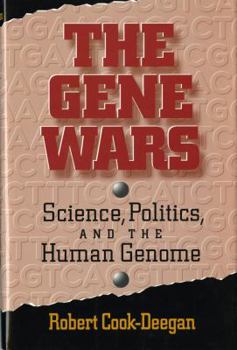Gene Wars
Select Format
Select Condition 
Book Overview
The Human Genome Project, the most ambitious biological research program ever undertaken, was born in controversy. Heralded by its more enthusiastic proponents as a quest for the "Holy Grail of biology"--and the key, ultimately, to the treatment of a variety of hereditary diseases--it has as its initial goal the mapping of all the genes in the entire three-billion-letter genetic code embodied in the DNA of a typical human cell. A major factor in the...
Format:Hardcover
Language:English
ISBN:0393035727
ISBN13:9780393035728
Release Date:April 1994
Publisher:W. W. Norton & Company
Length:416 Pages
Weight:1.62 lbs.
Dimensions:1.2" x 6.5" x 9.6"
Related Subjects
Administration & Medicine Economics Basic Sciences Biological Sciences Biology Biology & Life Sciences Education & Reference Ethics Ethics & Morality Evolution Genetics Medical Medical Books Medical History & Records Philosophy Political Science Politics & Government Politics & Social Sciences Public Policy Science Science & Math Science & Scientists Science & Technology Social SciencesCustomer Reviews
2 ratings
Curious about the genetics industry? Start here.
Published by Thriftbooks.com User , 24 years ago
I originally read this book for a college course about the ethics of genetics. It is something every person in the biological or natural sciences should read, but it is also helpful for anyone interested in genetics. It is primarily about the politics and ethics which surround all genetic issues. Cook-Deegan explains the rudiments of genetics in a very easy to understand manner, and then launches into an in-depth examination of the politics of genetics. More goes on behind the scenes of biological science than you would ever believe. In the coming years genetics and the ethical issues surrounding genetics are going to become very important in medicine, pharmaceutical research, and criminal forensics. No longer just a class for science majors, genetics may well enter your life in ways you never expected. Cook-Deegan's book can definately educate as well as entertain.
Human Genes should not be patented!
Published by Thriftbooks.com User , 27 years ago
November, 1997 "The Gene Wars: Science, Politics, and the Human Genome" by Robert Cook-Deegan (W.W. Norton & Company, New York, 1994) This is a fascinating book about the politics of the human genome project. Although I was familiar with much of the history of this project, it was good to read an organized, "insider's view". The author worked for the U.S. congressional Office of Technology Assessment (OTA) during the formative years of the project. The book starts out with a description of the horrors of Alzheimer's disease, and then goes on to explain the significance of the human genome project in terms of understanding human disease. With the significance of the work firmly established, the genesis of the human genome project is described - apparently the idea of sequencing the entire DNA sequence for a "single" human being was first realistically proposed by three different groups, working independently of each other, all about the same time (within a few months) during 1985. These groups all realized that the technology was quickly becoming available to achieve such a daunting task. To give you an idea of the difficulty of the task - imagine that you were to start reading the human genome, at one base every second (the genetic information coding for you (and all other animals and plants you see) is written down in a simple "text", just like this article; in the language of DNA, there are only four "letters" - G, A, T, and C) - to read the DNA sequence of a human being would take about 140 years - if you were to read one base a second, 24 hours a day, non-stop. The (frustrating) fact is that you really would not know anything about the person when you were done, except that they most likely had died (and had to pay taxes!) several years before their DNA sequence had been read. Obviously one needs computers to handle this kind of information. The best place for computers was at the National Laboratories in the U.S. Southwest - mainly Lawrence Livermore & Los Alamos National Laboratories. I had always thought that this was why the national labs had got involved in the genome project. To be honest, I had often wondered how the Department of Energy wound up financing the project - I was surprised to learn that in fact that one of the first groups to propose sequencing the human genome was from Los Alamos - in part kind of a "from nuclear bombs to plowshares" type of philosophy. But in fact, there was a bit more of a sinister twist to this plot - the U.S. military was trying to study the effects of the atomic blasts on the Japanese survivors from World War II. Furthermore I know (from personal conversations with scientists at Los Alamos during this time) that the U.S. military was seriously operating under Ronald Reagon's philosophy of fighting and surviving (?) a nuclear war. The result of all of this was that the human genome project was funded initially by the Department of Energy; basically it was a military






